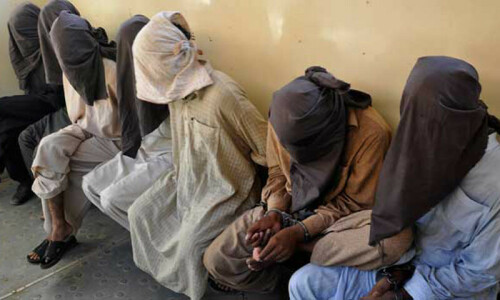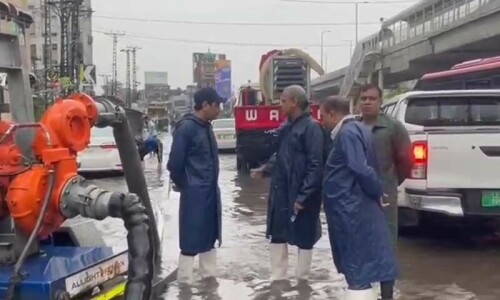NAIROBI: Kenya’s sudden spiral into chaos after years as a regional anchor has badly set back Africa’s democratic progress and will strike a heavy blow against the economies of a wide swathe of neighbouring nations.
In a few turbulent days since a tarnished election on Dec 27, Kenya has gone from democratic hope to disaster, from a country seen as an island of stability in a dangerous region to a new trouble spot torn by ethnic bloodletting.
The election, which Kenya’s opposition says was rigged to re-elect President Mwai Kibaki, ended a year in which democratic hopes in Africa had already been dented by a totally discredited poll in Nigeria and turmoil in the politics of South Africa, the continent’s economic locomotive.“This is the greatest setback to Africa’s reputation since the 60s. Kenya has an iconic status, seen as synonymous with Africa,” said Kenya expert Michael Holman.
But analysts do not believe Kenya’s crisis will contaminate other nations politically.
“The politics of every country in Africa are very, very separate. African politics are all local and all personal ... I don’t think it has any wider implications at all,” said Richard Dowden, director of the Royal African Society.
Control Risks senior Africa analyst Chris Melville agreed: “While Kenya is at the heart of an unstable region, we do not consider that the current situation will significantly contribute to regional instability in the short-term.”
Before President Mwai Kibaki’s hurried swearing-in on Sunday, the conduct of the poll had been praised by monitors and there was optimism Kenya would make another major step with the first handover by a president defeated at the ballot box.
Kibaki’s first victory in 2002 was a democratic watershed after 24 years of oppression under Daniel arap Moi.
But Kibaki’s inauguration, after results had appeared to clearly show Odinga heading for victory, uncorked the most dangerous force in Kenya —tribalism.
At least 300 people have died in clashes between Kibaki’s Kikuyu tribe and an alliance of others led by Odinga’s Luo.
ECONOMIC IMPACT
Kenya’s economy, thriving before the election, is at a near standstill and this is where the greatest regional knock-on is expected.
“Kenya has the largest economy by far in the region. Nairobi has got the largest population of a city and most diversified industrial base between Cape Town and Cairo for that region,” said Tom Cargill, Africa programme manager at the Chatham House think-tank.
“So it is going to have a serious impact because other countries rely on Kenya for its economy.”
Kenya’s port of Mombasa and the single road snaking up to Uganda and beyond are vital for the economies of the whole region. The impact of the crisis is already being felt with petrol pumps running dry in Uganda and Burundi and rationing imposed in Rwanda.
“The Mombasa-Nairobi road is the only way into Kenya, Uganda, Rwanda, Burundi, eastern Congo, southern Sudan and most of northern Tanzania,” Dowden said, adding that Kenya was also the base for aid operations into Somalia, Sudan and eastern Congo.“The implications of Kenya going a bit wobbly are pretty serious for the whole region.”
The road to Uganda, slow and badly maintained even in good times, runs close to some of the worst areas of ethnic tension and bloodshed over the last week.
“The longer this crisis goes on, the more that road is at risk not just from looters and so on but from those who want to hold either the country or the region to ransom by attempting to cut it,” Cargill said.
And the shock setback in Kenya, one of the continent’s strongest economies, could undermine general sentiment about Africa, some analysts say.
“There is going to be a global impact on people’s appetite for taking on risks in a region that appears from the outside to be incredibly fragile and able to turn one election into chaos,” said Columbia University Professor Josh Ruxin, who runs development projects in Rwanda.
Many analysts say Kenya’s reputation for democracy and stability was exaggerated even before the vote.
They suggest Western powers had turned a blind eye to blatant rigging in previous elections, as well as deep problems of wealth disparity and tribalism, because of Kenya’s value as a strategic ally and base for the United Nations and NGOs.
Whatever the outcome of Kenya’s crisis, perhaps its greatest impact will be deep pessimism about democratic change in Africa.
“What is happening is a big setback for democracy ... Once the people who were in opposition get into power, they no longer wish to respect democracy. You ask yourself what purpose these elections serve,” said Penda Mbow, Professor of History at Dakar’s Cheikh Anta Diop university. —Reuters










































Dear visitor, the comments section is undergoing an overhaul and will return soon.